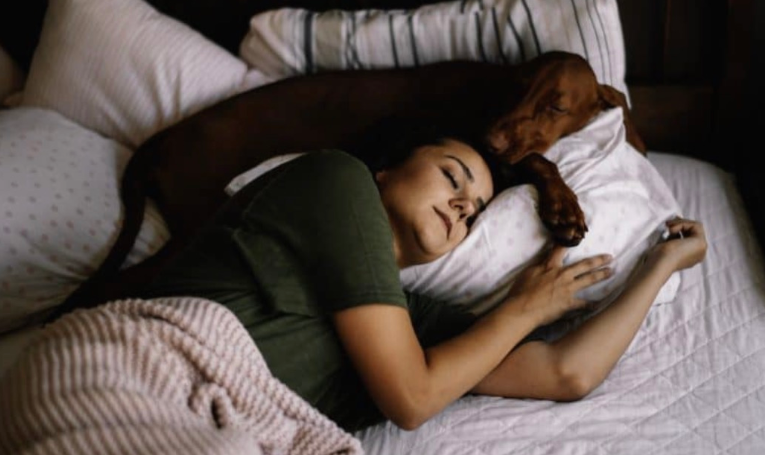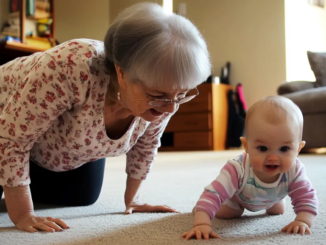
Undoubtedly, the importance of a good night’s sleep for overall health is widely acknowledged. With numerous studies exploring the optimal ways to achieve quality rest, recent research proposes a surprising solution, sharing the bed with dogs. Canisius College in New York State spearheaded this unconventional investigation, revealing that women experience better sleep next to their canine companions compared to human or feline counterparts.
Lead researcher Christy Hoffman, Ph.D., an animal behaviorist, conducted a survey involving nearly a thousand women across the United States to draw these intriguing conclusions. The results unveiled that 55% of participants shared their beds with at least one dog, 31% with a cat, and 57% with a human partner.

Hoffman delved into the reasons behind dogs emerging as superior sleep partners. The study highlighted that dogs’ sleep patterns align more closely with humans than those of cats. Hoffman theorizes that this synchronization may contribute to improved sleep quality, as dogs are adept at accommodating their owners’ sleep schedules, potentially mitigating disruptions caused by differing bedtime routines.
Furthermore, the structured routines imposed by dogs, such as morning walks, assist in regulating their owners’ daily schedules, thereby enhancing overall sleep quality. Another contributing factor is the physical stillness of dogs during sleep, unlike fidgety feline companions. Women in the study reported that dogs tended to remain on the bed throughout the night, fostering a sense of security and stability.
The study’s third crucial finding emphasizes the unique sense of security that dogs provide. Unlike cats or even human partners, dogs offer a heightened level of psychological comfort. Hoffman suggests that the perception of dogs as vigilant protectors, capable of alerting their owners to potential intruders, plays a role in enhancing the sense of security.

Despite these intriguing findings, the study acknowledges the subjectivity of sleep preferences. Factors such as a dog’s snoring or generating excess warmth could pose challenges. Additionally, there are individuals who find solace in the companionship of cats during bedtime.
It’s essential to note that the study relies on participants’ subjective perceptions of their pets’ impact on sleep quality and duration. Consequently, further research is necessary to definitively crown dogs as superior sleeping partners. Hoffman emphasizes the need for continued exploration into the various contexts under which pets positively or negatively influence sleep quality.
As American households increasingly welcome pets, understanding these dynamics becomes crucial. Future research may utilize technologies like Fitbit-like devices to objectively track sleep quality in diverse sleeping conditions, providing a more comprehensive understanding of the intricate relationship between humans and their animal companions during bedtime.
After 50 Years, Elderly Woman’s First Love Appears on Her Doorstep – Story of the Day

A few years after her husband died, Laura decided to move to her parents’ old apartment in Miami. But she was there only a month when her first love, Nathan, appeared on her doorstep. Their relationship was full of mystery until he simply disappeared. Finally, she was about to learn the shocking reason why.
A month ago, 78-year-old Laura took the plunge and moved to her parents’ old apartment in Miami. They bought it when they retired a long time ago, and she inherited it when they died. But Laura’s entire life was in Durham, North Carolina, so her family used it as a vacation spot for years.
She thought about moving when her husband, Charles, died six years ago, but it simply didn’t happen. Her daughter, Melissa, had just delivered her first child and Laura didn’t want to leave them. But the apartment remained in the back of her mind.
When Melissa announced her second pregnancy, Laura made her an offer. She didn’t want them to get into debt looking for a bigger house, so the older woman offered them her family house. It was big enough in case they expanded their family even more and was located in an excellent school district.
Melissa had tons of fond memories of her childhood, so she accepted immediately. “Are you sure you don’t want to live with us? This house has more than enough room for everyone,” Melissa suggested after Laura explained that she would be moving to Miami.
“Yes, darling. You guys need your space, and I need mine. Besides, that apartment has been empty for a long time, and it’s perfect for older folks. I also miss the beach like crazy. A warm beach, I mean,” Laura replied, nodding her head and patting Melissa’s shoulder.
Moving her life was hard, but she loved Miami. She was also happy that Melissa and her family would no longer pay for rent or be crippled by a mortgage as her old house was completely paid for.
Laura sat down on her balcony furniture and enjoyed the morning sun falling on her skin every day. Doctors might say that too much sunlight is harmful to your skin, but there’s something about that light and the salty smell of the sea that heals your soul. She couldn’t have been happier with the decision.
One day, she was making a nice sandwich with chips to eat for lunch when her doorbell rang. She removed her apron and went to answer it, thinking it might be her next-door neighbor who loved to gossip with her. But it wasn’t Mrs. Cardigan.
Laura’s eyes widened, and her jaw dropped when she recognized the man standing right outside her door. It was Nathan, her first love. And if she was honest with herself, he was the love of her life. Over the years, Laura sighed at the memory of him, even though she loved her husband dearly. Nathan had marked her forever.
They were both in their 20s and most people wouldn’t believe it, but their love felt like something you only read about in books. It was passionate. It was steamy. It was the stuff of legends. The downside was it was also volatile. Some would call it toxic. But Laura was in love.
Their other issue was Nathan’s mysterious nature. She knew practically nothing about his life or family, but she didn’t care, even when he often disappeared for days, weeks, and even months. That was harder to take. He dodged her questions whenever Laura brought up the subject, so she eventually stopped.
One day, Nathan left her old apartment with a smile on his face, and it was the last time she saw him. She waited for him to return and had no way to contact him. After a year of hoping, Laura decided to move on with her life. She met Charles, got married, and Nathan became a memory.
But there he was. Standing on her doorstep as if no time had passed. So many questions ran through her head while she gaped at him like a fish caught in a net. How did he find me in Miami? What is he doing here? Does he think we’re still 20 that he can just appear out of thin air? What does he want?
Finally, Nathan broke the silence. “Hey, Laura. How are you?”
“Hey? It’s been more than 50 years, Nathan. Why are you here? How did you find me?” she asked in a huff. She couldn’t believe Nathan had the gall to sound so carefree after all this time.
“I know. I want to explain everything. But will you let me in?” he wondered and smiled his crazy smile, which still managed to make her heart skip a beat even now. His face had wrinkles, sunspots, and he couldn’t stand as straight as he once did. But he was still… Nathan. Just Nathan.
“Fine. Come in,” Laura finally answered in a huff, crossing her arms and leading him into her apartment.
“How have you been all these years?” he asked after sitting down.
“I don’t have time for chit-chat, Nathan. I want answers. Real answers this time. I haven’t forgotten how you ignored me back then and changed the subject. You either start talking now or leave,” Laura snapped, sitting down on a chair across from him with her arms still crossed.
“Ok… this is not easy. But back then, my parents didn’t want me to date anyone. When I turned 20, they told me that they had arranged a marriage for me with the daughter of one of their wealthiest friends. But I didn’t want it. I only pretended. I fell in love with you. But I knew they would disapprove,” Nathan revealed with a huge sigh.
Laura’s mouth dropped open for the second time that day, and Nathan continued his story. “Whenever I disappeared, I was with her. Kiara. She liked to travel. She was so demanding. But I always returned to you.”
“Until the last time. I waited for a year, Nathan. I waited for you,” Laura hissed, getting emotional. She couldn’t believe Nathan had someone else. “And you were cheating on me the entire time.”
“I wasn’t! I swear I wasn’t! What I had with her was NOT romantic at all. I didn’t even hold her hand. She knew I didn’t want the arranged marriage all along, but Kiara forced my attention and my time. If I didn’t comply, she might have told my parents about you, and it would’ve been bad for you,” Nathan retorted, frustrated.
Laura thought about his words. She didn’t want to believe him, but he sounded genuine. “Ok… so why didn’t you return for such a long time?” she asked quietly.
“That year was hectic. I was graduating. My father got me a major internship, and Kiara started to plan our wedding. It was all so complicated. I couldn’t see you. But then, Kiara died in a car accident and the situation became even more complex. But I let some time pass. I helped her parents out because they thought I was her fiancé, and I went back to you as soon as I could,” he finished, looking down as if he couldn’t hold his head up after revealing everything.
“Oh, wow. I’m sorry. I mean, I wouldn’t wish harm on anyone,” Laura commented but remembered something he said. “What do you mean ‘returned?’ When did you return?”
“One day, I went to your house, and I saw another man there with you. I didn’t know what he meant to you, but I knew I couldn’t show up and ruin it after all that time. I went to your house every day for a month, and he was always there, so I stopped going. I heard you two got married at some point,” Nathan explained.
“Yeah, that was my late husband, Charles.”
“My condolences.”
“What happens now?” Laura asked, raising her eyebrows in question.
“I don’t know. I hoped to explain everything to you, and maybe we could start a friendship,” Nathan suggested.
“How did you find me all the way here?”
“I moved down here in my 30s. I’ve been here since. I never had any family. After losing you, I couldn’t fall for anyone else. Kiara’s death also haunted me. It was tough. But around 20 years ago, I saw your parents walking around. I found out where they lived and hoped to see you at some point. When they died, I noticed that you didn’t sell the apartment, so I continued waiting,” Nathan continued.

Laura couldn’t believe those words. Nathan never got married or had children. And he had been waiting for her to come here for more than 20 years. “Would you like a sandwich, Nathan?” she offered, changing the intense subject.
Soon enough, Nathan started coming over every day. At first, they were only friends. They chatted about everything under the sun. But at some point, they couldn’t deny their feelings any longer. No matter how much time had passed, their love never ceased. It was like a candle that only needed to be relit to burn bright.



Leave a Reply